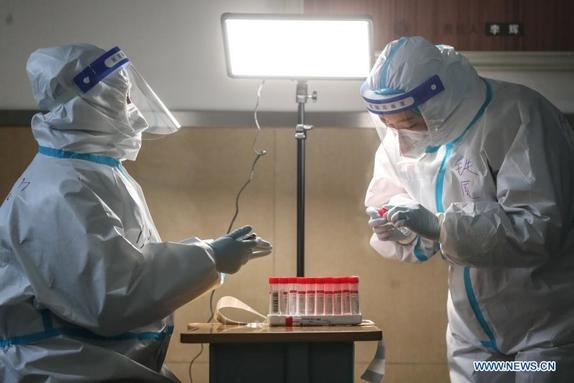 Passengers wearing face masks line up at a railway station in Shijiazhuang, Hebei province, Oct 7, 2020. (PHOTO / XINHUA)
Passengers wearing face masks line up at a railway station in Shijiazhuang, Hebei province, Oct 7, 2020. (PHOTO / XINHUA)
Xiaoguozhuang, a village in Shijiazhuang, Hebei province, was designated as a high-risk area for COVID-19 on Tuesday, the only such designation on the Chinese mainland, as the province adopted stricter measures to control the virus, including mass testing and suspending classes.
Expert panels sent by the Chinese Center for Disease Control and Prevention and the National Health Commission have arrived in Shijiazhuang city and Xingtai city to curb the latest outbreak, said Feng Zijian, deputy director of the China CDC.
Shijiazhuang, the provincial capital, will start citywide testing of all of its 10.39 million residents on Wednesday, Wang Jianfeng, a spokesman for the city government, said at a news conference on Tuesday night.
The source of the latest COVID-19 outbreak in Hebei is imported from overseas, and is highly likely to be from Europe, said Feng Zijian, deputy director of the China CDC
In Nangong, where confirmed cases were also found, the local government started mass testing for its around 500,000 residents on Sunday.
Hebei has seen COVID-19 cases surge since it reported the first confirmed case on Sunday in the latest outbreak. The province reported 14 new confirmed cases and 30 new asymptomatic carriers on Tuesday, bringing the total number of recently confirmed cases in the province to 19, according the provincial health commission.
ALSO READ: Hebei tightens COVID-19 measures, expands testing
The source of the latest COVID-19 outbreak in Hebei is imported from overseas, and is highly likely to be from Europe, Feng said in an interview with China Central Television on Tuesday.
The cases in Shijiazhuang, Xingtai and Nangong have epidemiological connections, he said, adding that they were likely to have been infected from the same source.
Four areas in Shijiazhuang and Xingtai have been designated as medium-risk zones and placed under lockdown since Monday, and the province announced on Tuesday that it has entered a state of war against the virus.
Many schools in the province, especially kindergartens, have been suspended as of Tuesday. Hebei University, in Baoding, which is next to Shijiazhuang, began its winter vacation on Tuesday.
READ MORE: China arranges pandemic control for school holidays
 Medical workers pack nucleic acid test samples for COVID-19 screening, in Heping district of Shenyang, northeast China's Liaoning province, Jan 5, 2021. (PAN YULONG / XINHUA)
Medical workers pack nucleic acid test samples for COVID-19 screening, in Heping district of Shenyang, northeast China's Liaoning province, Jan 5, 2021. (PAN YULONG / XINHUA)
On Tuesday, Liaoning province reported two new confirmed cases and Beijing reported one, according to the National Health Commission.
In Beijing's Shunyi district, all primary and middle school students, except those in the final years of junior and senior high, have moved to online classes to reduce the risk of infection. The district recently reported more than 10 confirmed COVID-19 cases.
Beijing will extend its quarantine period from 14 days to 21 days for people who travel from overseas to the capital, Xu Hejian, a city government spokesman, said at a news conference on Tuesday.
The city is facing a complicated situation in epidemic control because "some patients tested positive for COVID-19 after a 14-day quarantine", Xu said.


